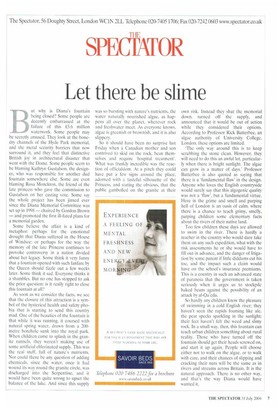Let there be slime
But why is Diana's fountain being closed? Some people are decently embarrassed at the failure of this £3.6 million waterwork. Some people may be secretly amused. They look at the bonedry channels of the Hyde Park memorial, and the metal security barriers that now surround it, and they feel that distinctive British joy in architectural disaster that went with the Dome. Some people seem to be blaming Kathryn Gustafson, the designer, who was responsible for another dud fountain somewhere else. Some are even blaming Rosa Monckton, the friend of the late princess who gave the commission to Gustafson on her casting vote. Some say the whole project has been jinxed ever since the Diana Memorial Committee was set up in 1998 — chaired by Gordon Brown — and promoted the first ill-fated plans for a memorial garden.
Some believe the affair is a kind of metaphor: perhaps for the emotional drought that Diana suffered in the House of Windsor; or perhaps for the way the memory of the late Princess continues to provoke controversy in a nation divided about her legacy. Some think it very funny that a fountain opened with such fanfare by the Queen should fizzle out a few weeks later. Some think it sad. Everyone thinks it a shambles. But no one has stopped to ask the prior question: is it really right to close this fountain at all?
As soon as we consider the facts, we see that the closure of this attraction is a symbol of the hysterical health and safety phobia that is starting to send this country mad. One of the beauties of the fountain is that while it was running, it coursed with natural spring water, drawn from a 200metre borehole sunk into the royal park. When children came to splash in the granite runnels, they weren't making use of some artificial chlorinated supply. This was the real stuff, full of nature's nutrients. Nor could there be any question of adding chemicals, since the water, once it had wound its way round the granite circle, was discharged into the Serpentine, and it would have been quite wrong to upset the balance of the lake. And since this supply
was so bursting with nature's nutrients, the water naturally nourished algae, as happens all over the planet, wherever rock and freshwater meet. As everyone knows, algae is greenish or brownish, and it is also slippery.
So it should have been no surprise last Friday when a Canadian mother and son contrived to skid on the rock, bean themselves and require 'hospital treatment'. What was frankly incredible was the reaction of officialdom. At a pinch they could have put a few signs around the place, adorned with a tasteful silhouette of the Princess, and stating the obvious, that the public gambolled on the granite at their own risk. Instead they shut the memorial down, turned off the supply, and announced that it would be out of action while they considered their options. According to Professor Rick Batterbee, an algae authority of University College, London, these options are limited.
'The only way around this is to keep scrubbing the stone clean. However, they will need to do this an awful lot, particularly when there is bright sunlight. The algae can grow in a matter of days.' Professor Batterbee is also quoted as saying that there is a 'fundamental flaw' in the design. Anyone who loves the English countryside would surely say that this algogenic quality was not a 'flaw', but a fundamental virtue. Here in the grime and smell and parping hell of London is an oasis of calm, where there is a chance to teach grimy, smelly, parping children some elementary facts about the rivers of their native land.
Too few children these days are allowed to swim in the river, There is hardly a teacher in the country who would dare take them on any such expedition, what with the risk assessments he or she would have to fill out in advance, and the danger of litigation by some parent if little diddums cut his toe, and the impact such a claim would have on the school's insurance premiums. This is a countryin such an advanced state of paranoia that the government is taken seriously when it urges us to stockpile baked beans against the possibility of an attack by al-Qa'eda.
So hardly any children know the pleasure of swimming in a cold English river; they haven't seen the rapids foaming like ale, the peat specks sparkling in the sunlight; their feet haven't felt the weed and slimy rock. In a small way, then, this fountain can teach urban children something about rural reality. Those who have turned off the fountain should get their heads screwed on, and start it up again. People will choose either not to walk on the algae, or to walk with care, and their chances of slipping and cracking their nuts will be the same as in rivers and streams across Britain. It is the natural approach. There is no other way, and that's the way Diana would have wanted it.


























































 Previous page
Previous page